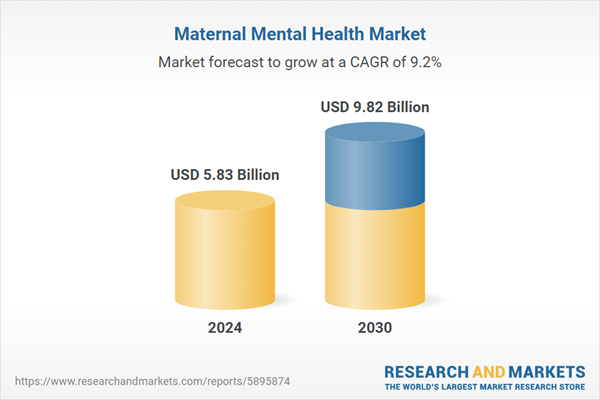Speak directly to the analyst to clarify any post sales queries you may have.
10% Free customizationThis report comes with 10% free customization, enabling you to add data that meets your specific business needs.
Rising awareness, the normalization of seeking help, and improved access to mental healthcare services are contributing to the market's growth. Additionally, healthcare providers and policy makers are implementing more comprehensive screening and treatment strategies. Technological advancements, including mobile health apps, wearable monitoring devices, and AI-powered analytics, are also playing a pivotal role in early detection and personalized intervention. The increasing global birth rate, coupled with heightened awareness and support infrastructure, is expected to fuel robust growth in the maternal mental health market over the coming years.
Key Market Drivers
High Prevalence of Maternal Mental Health Disorders is Driving Global Maternal Mental Health Market
The increasing recognition of the prevalence and impact of perinatal mental health disorders is a primary driver for the market. Conditions such as postpartum depression, general anxiety, and PTSD are now known to affect a substantial proportion of women during and after pregnancy. Studies indicate that up to one in seven women in the U.S. experience postpartum depression, with other regions reflecting similarly high rates. The COVID-19 pandemic further intensified maternal mental health concerns, with research from the University of Michigan highlighting that nearly one in three mothers during early 2020 experienced symptoms of depression. This growing awareness has encouraged greater demand for mental health services tailored specifically to the maternal population. Healthcare systems, non-profits, and governments are increasingly supporting maternal mental health programs, while tech firms and pharmaceutical companies are innovating around treatment and support tools, further driving market expansion.Key Market Challenges
Stigma and Awareness
One of the major obstacles hindering market growth is the persistent stigma surrounding mental health during and after pregnancy. Many women feel pressured to conform to societal expectations that motherhood should be a purely joyful experience, leading to feelings of guilt or fear of judgment if they disclose emotional distress. As a result, many mothers delay or avoid seeking treatment altogether. Compounding this issue is the lack of consistent mental health screening in prenatal and postpartum care. To combat these barriers, efforts must focus on awareness campaigns, caregiver training, and integration of mental health checks into routine maternal care. Destigmatizing maternal mental health through education and supportive community platforms remains essential to unlocking further growth in the market.Key Market Trends
Technological Advancements
Technology is playing a transformative role in the maternal mental health market. The rise of telehealth has made it easier for women to access care from the safety and privacy of their homes. Mobile apps designed for mood tracking, meditation, and personalized support are becoming more prevalent, offering scalable and accessible mental health solutions.Wearable technologies also support continuous monitoring of vital signs and stress indicators, enabling early detection of mental distress. Artificial Intelligence is being used to analyze behavioral and physiological data, helping predict mental health risks and guide timely interventions. Moreover, Virtual Reality is emerging as a therapeutic tool for treating postpartum anxiety and PTSD by offering immersive relaxation and exposure therapy experiences. Collectively, these technological developments are helping to reduce barriers to care, improve treatment personalization, and enhance patient engagement.
Key Market Players
- Therapy Mama
- Canopie
- Pfizer Inc
- Viatris Inc.
- GlaxoSmithKline Inc.
- Alembic Pharmaceuticals Limited
- Mallinckrodt Inc.
- Sage Therapeutics, Inc.
- Bausch Health Companies Inc.
- Magellan Health, Inc.
Report Scope:
In this report, the Global Maternal Mental Health Market has been segmented into the following categories, in addition to the industry trends which have also been detailed below:Maternal Mental Health Market, By Disease Indication:
- Postpartum Depression
- Dysthymia
- Pregnancy and Postpartum General Anxiety
- Pregnancy and Postpartum OCD
- Birth-Related PTSD
- Others
Maternal Mental Health Market, By Therapy:
- Interpersonal Psychotherapy
- Antidepressants
- Cognitive Behavioral Therapy
- Others
Maternal Mental Health Market, By Region:
- North America
- United States
- Canada
- Mexico
- Europe
- France
- United Kingdom
- Italy
- Germany
- Spain
- Asia-Pacific
- China
- India
- Japan
- Australia
- South Korea
- South America
- Brazil
- Argentina
- Colombia
- Middle East & Africa
- South Africa
- Saudi Arabia
- UAE
Competitive Landscape
Company Profiles: Detailed analysis of the major companies present in the Global Maternal Mental Health Market.Available Customizations:
With the given market data, the publisher offers customizations according to a company's specific needs. The following customization options are available for the report.Company Information
- Detailed analysis and profiling of additional market players (up to five).
This product will be delivered within 1-3 business days.
Table of Contents
Companies Mentioned
- Therapy One Inc.
- Canopie
- Pfizer Inc
- Viatris Inc.
- GlaxoSmithKline Inc.
- Alembic Pharmaceuticals Limited
- Mallinckrodt Inc.
- Sage Therapeutics, Inc.
- Bausch Health Companies Inc.
- Magellan Health, Inc.
Table Information
| Report Attribute | Details |
|---|---|
| No. of Pages | 182 |
| Published | May 2025 |
| Forecast Period | 2024 - 2030 |
| Estimated Market Value ( USD | $ 5.83 Billion |
| Forecasted Market Value ( USD | $ 9.82 Billion |
| Compound Annual Growth Rate | 9.2% |
| Regions Covered | Global |
| No. of Companies Mentioned | 10 |








